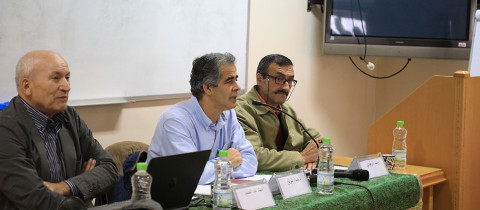
Educators, sociologists criticize school education
December 2, 2019
Birzeit University’s Department of Curriculum and Instruction and the Institute of Women’s Studies jointly organized a lecture to discuss the current situation of Palestinian school curricula in the social sciences on December 2, 2019.
Commenced by Jehad Alshwaikh, an associate professor in the Department of Curriculum and Instruction, the lecture featured researcher and writer Mohannad Abd Al-Hamid and Wisam Rafidi, an instructor of sociology at Bethlehem University.
The speakers gave a critical analysis and perspective, placing profound focus on the concepts underlying the discourse on and teaching of history and religion. They considered how these concepts are implemented and interpreted in Palestinian schoolbooks and discussed their relevance to Palestinian society.
Abd Al-Hamid reflected on the relevance and importance of these topics, especially in the unique context of Palestine under the Israeli occupation, and stressed on the importance of having an educational pedagogy that asserts Palestinian identity and culture. This goal, however, is yet to be achieved, according to Al-Hamid, and requires that a number of difficulties and challenges are resolved in the current Palestinian curricula.
Abd Al-Hamid elaborated on these difficulties by explaining how Palestinian schools’ sociological curricula must offer more space for the development of critical thinking and efficient analysis. “To achieve this end,” Abd Al-Hamid suggested, “the Palestinian government should revise and reconsider the current curricula. It must introduce a solid concept of national identity instead of sticking to minor identities that weaken the unity of Palestinian society.” He also emphasized the importance of lifting restrictions on specific scientific themes and topics that limit the scope of scientific curricula.
Regarding the challenges such an endeavor must overcome, Rafidi shed light on how historical and religious concepts are projected into curricula, thereby making them less objective.
Rafidi touched upon the importance of enriching the teaching of Palestinian history by avoiding that some of its aspects are omitted, as is the case in the current curricula. The current treatment of historical narrative, according to Rafidi, puts the Palestinian cause out of context. “When we omit these facts,” Rafidi stated, “the core of these curricula becomes romantic rather than rational, uncritical instead of critical. The discussion is subjective instead of objective when a misleading mixture of concepts occurs.”
“The absence of critical thinking and analysis creates minor identities instead of making students belong to a more unified identity in Palestinian society,” Rafidi concluded.



